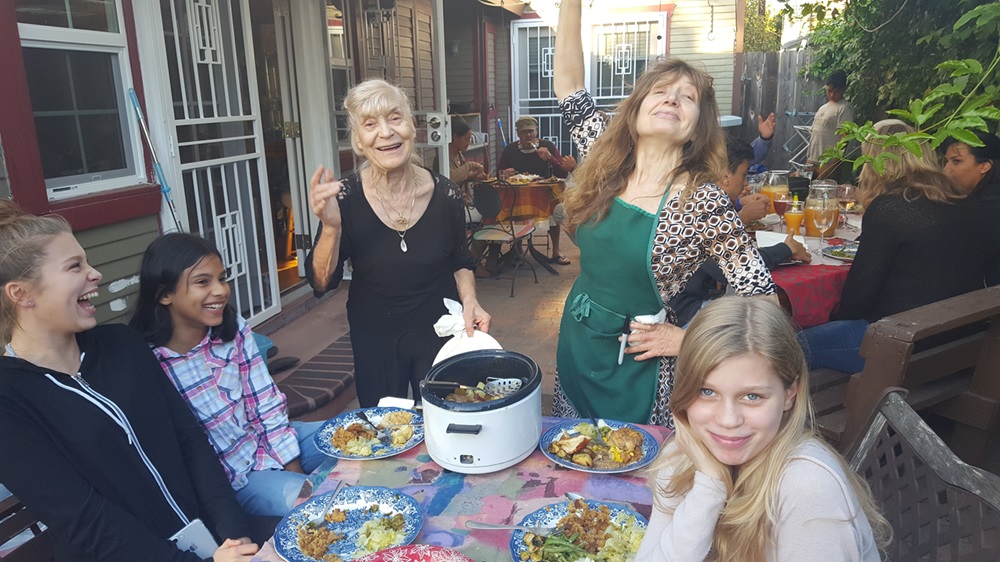Vicky’s B&B, Khayetlisha, South Africa

Vicky’s BB, Khayetlisha.
–
In writing about South Africa, I wanted to finish on a high note. I really did. But I’m at the end now, and this last post about our trip deals with stuff that is, in no uncertain terms, heartbreaking and tragic.
I’m sorry. In the wake of the last few weeks, I really wanted to talk about something lighthearted. And I promise, I will. I’ll tell you about the crazy London hotel in which we got hopelessly lost, about the wonderful bagels we had there and the markets we went to with friends. I will tell you about Australia and the damn birds that kept stealing our breakfast, and the day I swam with sea turtles, and how my husband kept telling me, in spite of how self conscious I was in a bathing suit, that I was beautiful.
I can’t wait, actually – I think talking about all of that would be really, really good for my heart and my soul and my long-suffering brain. Just thinking about those trips makes me smile and realize how damn charmed my life is.
But right now, in the wake of all of the tragedies of the last few weeks, I have to tell you one last story from South Africa: it’s about Vicky Ntozini. As sad as it is, she deserves to have her story told.
Thandis, our guide and driver for our township tour, told us about Vicky as we drove towards the popular bed and breakfast that she owned in Khayelitsha in the Cape Flats.
Many people were forced to move here under the Group Areas Act (one of the many segregationist laws of apartheid, this act pushed people out of their homes, and into townships according to race). The name of the town – Khayetlisha – comes from the Xhosa word for “new home”.
Today, Khayetlisha is one of the largest townships in South Africa: its population is nearly half a million. Life there is by no means easy.

Two little girls walk down a dirt road in the Cape Flats.
–
70% of the population live in shacks of wood and corrugated metal. One in three has to walk more than 200 meters to get to a fresh water supply. Roughly a quarter of the population under the age of 35 is HIV-positive. Less than 10% of the homes there are “food secure” – a term used to describe when people are getting a proper amount of food and nutrients (this report on the topic of food insecurity is pretty fascinating, but please note that it is a PDF). About half the population is unemployed.
Crime is rampant, and police officers have refused to investigate certain cases out of fear for their own safety.
While we enjoyed our visit there, and the people we encountered were very friendly, I don’t want to sugar coat it: it’s a rough place to live.

Some horses graze on the outskirts of Khayetlisha.
–
But Vicky was determined to make this township a better place for her and her five children. In the late 90s, (when she only in her mid-twenties), the roots of her B&B began to form when she opened up her home to tourists and students, in hopes of helping them understand township life a little better.
By 2012, the year of Vicky’s death, her B&B had six rooms (including two master suites) and had amassed a great deal of positive press. It was mentioned in Lonely Planet, and the reviews on Trip Advisor are stellar. Guests noted Vicky’s amazing hospitality, her delicious cooking, and how welcomed they felt by her and her family.
Vicky was intent on teaching foreigners what life was like in her town, and led numerous tours throughout Khayetlisha, including trips to schools and traditional Xhosa ceremonies. She helped arrange volunteer programs for a number of guests who were interested in helping out, and worked closely with many NGOs. Through connections she’d made, Vicky solicited donations for food, supplies, and equipment to the township. She even helped organize gifts deliveries for children during Christmas.
We listened intently to Thandis’ story. Listening to all that Vicky had accomplished was comforting in light of everything we’d seen in the last few hours. It started to seem like there was a chance for real change in the townships.
“So,” asked one of the English sisters on our tour, sensing something was amiss in our guide’s tone, “what happened to her?”
Thandis’ reply was blunt.
“Two months ago, she was murdered.”
We collectively gasped. He explained that Vicky had been stabbed to death (apparently in front of several of her children. One of the older ones who was home at the time begged him to stop.), allegedly by her husband, in the B&B that she had built. After the struggle, he ran into another room and tried to kill himself.
“Was he jealous of her success?” one of the sisters asked.
“Yes,” Thandis said. “How did you know?”
To us outsiders, this was the obvious motive. But to those who knew Vicky and her husband (who is often mentioned in many of the reviews as being a kind and gracious host, seemingly supportive of his wife’s endeavors) this was unfathomable.
We pulled onto the side of a dusty dirt road in Khayetlisha.
“Here is Vicky’s Bed & Breakfast,” Thandis said, pointing to a brightly colored two-story building in front of us. It was a step up from the shacks we’d seen lining the streets, but it had the same corrugated metal exterior. It looked welcoming and comfortable, but not entirely out of place in its surroundings.

–
“And that was where she planning the restaurant,” he said, gesturing to a pile of cinder blocks not far away, “before she was murdered.”
The pile of blocks was heartbreaking. I have no doubts that Vicky had moved a number of them there herself. This was a woman who had literally built her business from the ground up.
Thandis opened the driver side door.
“Now we’ll go inside,” he said.
We sat, stunned.
“What? Inside the building where she was murdered?” gasped one of the sisters. Thandis calmly nodded. His intention was not, I think, to shock or upset us. Rather, I think he simply wanted to show us the reality of what was happening in the townships.
So we went inside.
Have you ever been in someone’s home right after they’ve died? The loss in the air is almost tangible – you feel like you could reach out and touch it. It hangs over everything, settling on tabletops and window sills and even on people. And you feel like if someone doesn’t open a window, the weight of it might crush you.
That was what it was like inside Vicky’s B&B. Apart from the patina of sadness and shattered dreams, it wasn’t an unpleasant place. The interior was slightly worn, but very clean. There were wood panels on the walls, and a mishmash of bright paint everywhere else. It was like a 70s rumpus room crossed with a cheesy Mexican-themed restaurant.
“This is Vicky’s daughter,” Thandis said, gesturing to a previously unseen teenager in cut-off shorts. “She will tell you about the bed and breakfast.”
I don’t actually know if I can properly articulate how heartbreaking it was. This was a kid – a friggin kid – who had just lost her mother six weeks ago. She’d seen it happen (at the hands of her own dad, no less) and was suitably shell-shocked. Her eyes had a faraway look, and her expression wasn’t so much sad as it was resigned. This was her life. This was how things were.
She walked us upstairs and showed us around. It was bright and slightly crowded with furniture.

The two English sisters sit in Vicky’s B&B. They’d brought colored pens for the kids.
–
There was a communal sitting area with a few couches arranged around a coffee table, and the occasional lounging house cat (they went almost unnoticed amidst the scattering of stuffed animals throughout the room).
A TVand DVR player took prominence in one corner of the room (the B&B rose to prominence during South Africa’s World Cup, after all) and the guest rooms and bathroom were off of this main living area. On the walls were dozens of framed newspaper clippings about Vicky and the B&B, thank you letters and awards, and a handful of photos, including one of Vicky and her husband that I kept sneaking glances at.
Vicky’s daughter stood, staring fixedly at a spot on the ground just off to left, and told us the history of the B&B and of her mother. She obviously didn’t go into detail about her mother’s death, saying only that “In November, Vicky passed, and now her children run the B&B.”
I wanted to say something to her – in hindsight, I really, really wish I had – but chickened out. I mean, what the hell do you say to a kid who’s lost both parents to the violence of the townships? Who had witnessed it with her own eyes? Someone who had three younger siblings (one as little as 5) that she would now have to raise with the help of her oldest sister?
“I’m sorry for your loss”? Really? Would that cut it? Or would it just sound ridiculous coming from a privileged American? It probably would have been better than nothing, but I opted for the latter and said not a word.
The kid deserved better from me. And from life.
The English women were more forthcoming, asking questions and offering words of consolation.
“What do you want to do when you grow up?” one of them asked.
There was a brief, almost imperceptible flicker of light in the kid’s eyes, but it vanished so quickly I wondered if I had imagined it. She explained that she wanted to be a nurse, but it sounded hollow. What had once seemed attainable with her mother around was now an impossibility.
When Vicky died, another victim of the domestic violence that plagues the townships, she seemed to take hope for a better future with her.
“You’ll all have to take care of each other now, won’t you?” one of them ventured, delicately. Vicky’s daughter didn’t reply.
She invited us to take a look around, and then retreated. I don’t remember if she went downstairs, or simply stood in the corner of the room, staring at the floor. Either way, she was both there and not. (Not unlike her mother, whose presence and absence could be acutely felt.)

One of the many ads and clippings around the room. From every angle, Vicky was looking down at us.
–
We poked our heads into a few of the rooms. I hope you’ll forgive me for not taking too many photos, but given what had happened here, I thought it would be rude to do so.
The suites were nice, clean and cozy. They reminded me of a guest bedroom at my aunt’s house.

–

–

One of the master suites.
–

The immaculate bathroom in one of the master suites.
–
This keychain was particularly heartbreaking:

–
We stood about in an uncomfortable silence. Rand’s face captures it well.

–
We tucked a few rand into a donation box, thanked Vicky’s daughter (who was downstairs, looking more comfortable in the company of several older women and a few children – I assumed all were relations of Vicky’s.) and walked back to our van in silence.
After a few minutes of driving, we began to talk, at first in clipped observations …
“That was so sad.”
“She accomplished so much in such a short time.”
“What is going to happen to those kids?”
… eventually leading to a long discussion with Thandis about domestic violence in the townships. It is a growing problem, but one that goes largely unreported. Thandis revealed himself to be incredibly progressive, noting that if the townships were ever going to thrive, men needed to start regarding women as their equals.
He noted that even in tribal life, women worked, so the notion that they couldn’t do so now wasn’t just antiquated – it was flat out wrong.
One of the English women said that what the townships needed were women’s organizations that help the abused. I nodded, mutely, but felt that the problems were far more entrenched than that. Some sort of women’s help center would be wonderful, sure, but it would be akin to trying to put a new coat of paint on a burning house. The first thing that you need to do is put out the damn fire.
I stared out the window, at the dusty landscape, and thought about how extraordinary Vicky was, but how her tragic death was all too common. She was another woman who had met a violent end in the townships. I thought about her children, and her grieving teenager.
I tried to tell myself that there was hope for them. That their mother could still serve as an inspiration to them, even in her death. That they could triumph over all of it, and continue Vicky’s legacy.
I had no basis for any of it. It was just a pipe dream that entered my head as we passed mile after mile of shack-filled townships, my mind’s way of putting a coat of paint on a house that was already engulfed in flames.









Leave a Comment